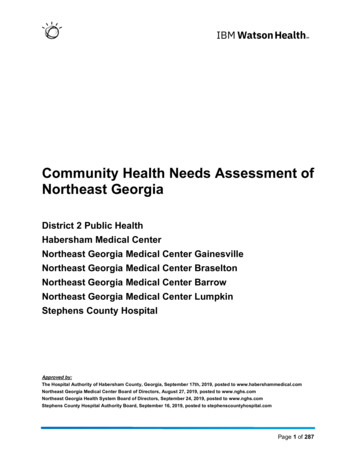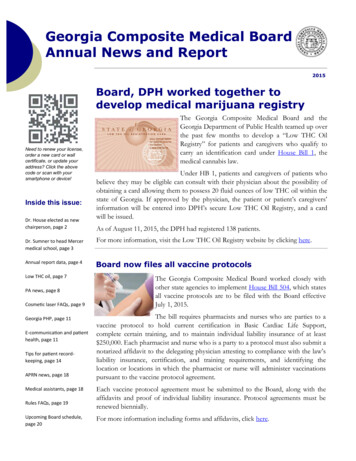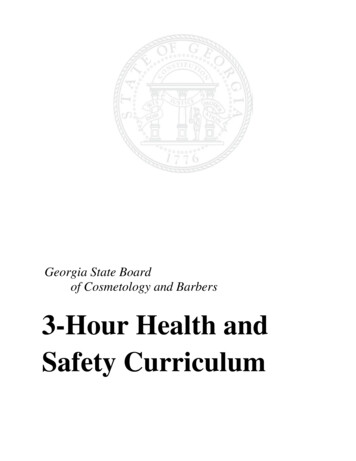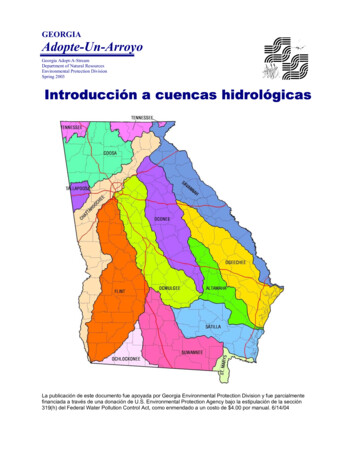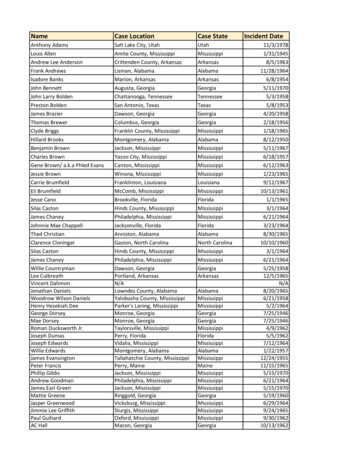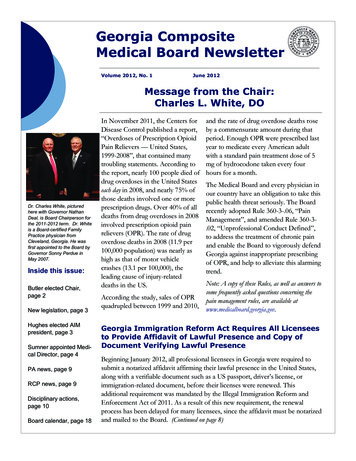
Transcription
Georgia CompositeMedical Board NewsletterVolume 2012, No. 1June 2012Message from the Chair:Charles L. White, DODr. Charles White, picturedhere with Governor NathanDeal, is Board Chairperson forthe 2011-2012 term. Dr. Whiteis a Board-certified FamilyPractice physician fromCleveland, Georgia. He wasfirst appointed to the Board byGovernor Sonny Perdue inMay 2007.Inside this issue:Butler elected Chair,page 2New legislation, page 3Hughes elected AIMpresident, page 3Sumner appointed Medical Director, page 4PA news, page 9RCP news, page 9Disciplinary actions,page 10Board calendar, page 18In November 2011, the Centers forDisease Control published a report,“Overdoses of Prescription OpioidPain Relievers — United States,1999-2008”, that contained manytroubling statements. According tothe report, nearly 100 people died ofdrug overdoses in the United Stateseach day in 2008, and nearly 75% ofthose deaths involved one or moreprescription drugs. Over 40% of alldeaths from drug overdoses in 2008involved prescription opioid painrelievers (OPR). The rate of drugoverdose deaths in 2008 (11.9 per100,000 population) was nearly ashigh as that of motor vehiclecrashes (13.1 per 100,000), theleading cause of injury-relateddeaths in the US.According the study, sales of OPRquadrupled between 1999 and 2010,and the rate of drug overdose deaths roseby a commensurate amount during thatperiod. Enough OPR were prescribed lastyear to medicate every American adultwith a standard pain treatment dose of 5mg of hydrocodone taken every fourhours for a month.The Medical Board and every physician inour country have an obligation to take thispublic health threat seriously. The Boardrecently adopted Rule 360-3-.06, “PainManagement”, and amended Rule 360-3.02, “Unprofessional Conduct Defined”,to address the treatment of chronic painand enable the Board to vigorously defendGeorgia against inappropriate prescribingof OPR, and help to alleviate this alarmingtrend.Note: A copy of these Rules, as well as answers tosome frequently asked questions concerning thepain management rules, are available atwww.medicalboard.georgia.gov.Georgia Immigration Reform Act Requires All Licenseesto Provide Affidavit of Lawful Presence and Copy ofDocument Verifying Lawful PresenceBeginning January 2012, all professional licensees in Georgia were required tosubmit a notarized affidavit affirming their lawful presence in the United States,along with a verifiable document such as a US passport, driver’s license, orimmigration-related document, before their licenses were renewed. Thisadditional requirement was mandated by the Illegal Immigration Reform andEnforcement Act of 2011. As a result of this new requirement, the renewalprocess has been delayed for many licensees, since the affidavit must be notarizedand mailed to the Board. (Continued on page 8)
VOLUME 2012, NO. 1GEORGIACOMPOSITE MEDICAL BOARDPAGE 2Board Elects William J. Butler, MD asNew Chair, Richard Weil, MD as New Vice-ChairOn June 7, 2012, the GeorgiaMedical Board (GCMB) electedVice-Chairman William J.Butler, MD of Macon to chairthe Board for the July 2012 –June 2013 term. Dr. Butler, aprofessor and Chair in theDr. William Butler, incoming Department of Obstetrics andChairperson, is a professorand chairman in the Mercer Gynecology at Mercer UniversityUniversity School ofSchool of Medicine and DirectorMedicine’s Department ofof the Central Georgia FertilityObstetrics and Gynecology.He has served on the Board Institute, is Board Certified insince 2007.Obstetrics, Gynecology,Reproductive Endocrinology, Infertility and Genetics.Prior to moving to Macon in 1999, Dr. Butler was theDirector of the Division of ReproductiveEndocrinology at The Medical University of SouthCarolina School of Medicine. He was originallyappointed to the Board by Governor Sonny Perdue inApril 2007. He has been licensed in Georgia since 1982.The Board also electedRichard L. Weil, MD ofAtlanta to the position ofVice-Chairman. Dr. Weil, aBoard-certified pediatrician atPiedmont Pediatrics, serves asChief of Pediatrics atPiedmont Hospital and onthe Board of Directors for Kids Health FirstPediatric Alliance. A member of the CompositeMedical Board since April 2008, Dr. Weil hasbeen honored as a “Top Doc” in pediatrics byAtlanta Magazine for four consecutive yearsbeginning in July 2008. In May 2012, he wasnamed by U.S. News & World Report as one of thetop 1% pediatric physicians in the nation. Dr.Weil has been licensed in Georgia since 1982.Deal Appoints Two, Reappoints Two to BoardIn October 2011, Governor Nathan Deal appointedGainesville physician Gilbert S. Chandler III, MD tothe Board to fill the unexpired term of Jean Sumner, MD.Dr. Chandler, a founding member of Specialty Clinics ofGeorgia, is a pain management specialist and a memberof the American Academy of Pain Medicine, the International Spinal Injection Society, and the Medical Association of Georgia, and is Board Certified in Anesthesiologyand in Pain Management. He has been licensed in Georgia since 1992.In February 2012, Governor Deal appointed Atlanta physician Wendy A. Troyer, MD to fill theunexpired term of John T. “Ted” Perry, MD. Since1999, Dr. Troyer has served as the director of Neonatology Associates of Atlanta, a large practice specializing in neonatology, pediatric intensive care,and pediatric genetics. Dr. Troyer is Board Certifiedin Pediatrics and in Neonatal-Perinatal Medicine.She has been licensed in Georgia since 1990.(Continued on page 3)Are you a dispensing physician?If you dispense medications from your office, youby state law to provide the Georgia Board ofare required to notify the Board. By “dispense,” wePharmacy with the name, location, license number,mean to issue or administer the medication (asand DEA number for each physician who dispensesopposed to issuing the prescription only); and weor intends to dispense drugs. A copy of the responsemean dispensing medication other than free samples form is included on page 15.from the drug manufacturer. The Board is required
VOLUME 2012, NO. 1GEORGIAPAGE 3COMPOSITE MEDICAL BOARDPain Management Clinic Bill and Continuing Education BillsDie; Abortion Bill PassesHB 972 sought to enact the Georgia Pain Management Clinic Act, and would have required thatpain management clinics in Georgia apply for andrenew licenses issued and regulated by the MedicalBoard. The bill also sought to require coroners toprovide a copy of their report to the Board if thereport indicated that the cause of death could havebeen the result of medication administered or procedure conducted at a pain management clinic.The bill passed the House by a vote of 124-38 onMarch 5, 2012. The Senate passed a substitute billthat deleted the coroner-reporting requirementand added a grandfather clause for unlicensedowners of pain management clinics by a vote of49-3 on March 27, 2012. However, the Senate’ssubstitute bill was not voted on by the House.HB 954 required physicians to determine probable gestational age of the fetus prior to performing an abortion, except in the case of medicalemergency or determination that the pregnancywas medically futile, and limited abortions after20 weeks to cases in which the mother’s healthwas at risk or the pregnancy was medically futile.The bill specified that violations of its provisionsby a physician would constitute unprofessionalconduct for license sanction purposes. (More updates on page 4)Deal Reappoints Gross and Lee to BoardIn July 2011, Governor Deal reappointed Alexander Gross, MD ofCumming to the Board for a newterm expiring July 1, 2015. Dr.Gross, who was first appointed tothe Board in 2008, is a fellow of theAmerican Academy of Dermatology, the American Society of Dermatologic Surgery, the AmericanAcademy of Cosmetic Surgery, andthe American College of Laser(continued from page 2)Medicine and Surgery. He served asBoard Chairman for the 2010-2011term.In October 2011, Governor Dealreappointed Marion Lee, MD of Tifton to a new term expiring July 1,2014. Dr. Lee is Board Certified bythe American Board of Anesthesiology, the American Board of Interventional Pain Physicians, the American Board of Pain Medicine, theAmerican Board of AddictionMedicine, and the AmericanBoard of Independent MedicalExaminers. He served on theNominating Committee of theFederation of State MedicalBoards from 2010 to 2012, andserves on the Board of Directorsof the Georgia Society of Interventional Pain Physicians as itsImmediate Past President.Board Executive Director LaSharn Hughes Elected Presidentof Administrators in MedicineAt its annual meeting in FortWorth, Texas on April 25,2012, the Administrators inMedicine (AIM) electedLaSharn Hughes, ExecutiveDirector of the Georgia Composite Medical Board, as itsnew President. Ms. Hughessucceeds Blake Maresh, Executive Director of theWashington State Board of Osteopathic Medicine& Surgery. Ms. Hughes, who has served as Executive Director of the Medical Board since 2003,has held several key leadership posts in AIM, including Southern Region Representative, Secretary, and Vice President.AIM, a not-for-profit organization founded in1984, is the national organization for state medical and osteopathic board executives.
VOLUME 2012, NO. 1GEORGIAPAGE 4COMPOSITE MEDICAL BOARDJean Rawlings Sumner Appointed Medical DirectorIn September2011, JeanRawlingsSumner, MDresigned herseat on theBoard to accept its appointmentas Medical Director effectiveOctober 1, 2011. Dr. Sumner,an internal medicine physicianin Sandersville, Georgia, has along and distinguished historyof public service to the peopleof Georgia, and has served as amember of the Board of theGeorgia Composite MedicalBoard, but also on the Boardsof the Georgia Department ofHuman Resources, the StateMedical Education Board, andthe Georgia Department ofCommunity Health.Dr. Sumner is listed as a LocalLegend in the National Institutes of Health’s National Library of Medicine. A graduateof the Medical College of Georgia’s School of Nursing, Dr.Legislative and Other UpdatesHB 785: Passed. Prohibitsthe conditioning of physicianand dentist licensure upon participation in a public or privatehealth insurance plan, publichealth care system, public service initiative, or emergencyroom coverage, and reservedsole responsibility of the licensure of physicians in Georgia tothe Georgia Medical Board.HB 247: Passed. Grantedimmunity to anyone who actedin good faith in accordance witha Physician Order for LifeSustaining Treatment.SB 288: Failed. Sought toallow pharmacists to administerall vaccines for patients betweenthe ages of 19 and 49. The billfailed to reach the House floorafter passing 43-7 in the Senate.HB 1303: Failed. Sought toSumner earned her MD degreefrom Mercer University Schoolof Medicine in 1986, earningthat year’s Distinguished Graduate Award. In 1995, she receivedthe James Alley Service Awardfrom the Georgia Rural HealthAssociation for her strong advocacy on behalf of rural healthissues. Her acceptance of theappointment to the position ofMedical Director fills a role thathad been vacant since April2010.(continued from page 3)grant physician assistants theauthority to prescribe ScheduleII drugs.HB 1143: Failed. Sought toexempt orthotists and prosthetists from the requirement ofMedical Board licensees to earnat least 40 hours of continuingeducation biennially, and to allow the Board to define howmany hours of continuing education are required.Funding for the CosmeticLaser Services Act:Failed. The Board soughtfunding to implement the Cosmetic Laser Services Act, whichwas originally passed in 2007 byvotes of 139-6 in the House and46-5 in the Senate, and then wasamended and passed in 2008 byvotes of 47-0 in the Senate and156-8 in the House. The billsrequired funding by specificreference to the Act in order tobecome effective. The Boardwas unsuccessful in its mostrecent attempt to secure theauthority to implement and enforce this law, which seeks toenhance the safety of cosmeticlaser patients by mandating licensure and prudent regulation,including training and continuing education.Prescription MonitoringProgram. In 2011, the Gen-eral Assembly authorized thecreation of a prescription monitoring program. The Board ofPharmacy has posted a RequestFor Proposal for these services.The Advisory Committee forthe program will include fivephysicians.
VOLUME 2012, NO. 1GEORGIACOMPOSITE MEDICAL BOARDPAGE 5Trouble logging in because you can’t remember your user IDor password? Follow these tips.Your user ID isan emailaddress.Your GCMB userID should be a validemail address. That’sbecause if you everforget your passwordand request a newone, the system willsend you a new temporary password to your userID (email address). So try to think of the emailaddress you may have used the last time youaccessed our online services.You can reset your password online.If you knowyour user ID,you canprobablyreset yourpasswordyourself. Go to the login page, and instead of tryingto log in, just click the link below the passwordfield. Then, you’ll be asked to type your user ID.Once you enter your user ID and click “Next,”you’ll be asked to provide the correct answer to thesecurity question you set up.After youprovide thecorrect answerto the securityquestion, thesystem will reset your password to a temporarypassword and email that to the email address youused as your user ID.The email message will contain a temporarypassword you can use to log in.If you can’t see yourlicense number afteryou log insuccessfully, call theBoard.If you logged in successfully,but don’t see your licensenumber, you may havelogged in as a new user, rather than trying to useyour existing user ID and password. This means youcreated an account as a user who has never beforebeen known to the Board. If you encounter thisissue, or cannot log in or reset your password aftertrying to follow the preceding steps, call the Board at404-463-8900 or 404-656-3913 for assistance inresetting your account.Board Announces Intent to AwardProfessional Health Program ContractOn June 11, 2012, the Board announced that GeorgiaProfessional Health Program was the apparent successful offeror to conduct the Board’s ProfessionalHealth Program. The Request for Proposal was issuedon April 24, 2012.Proposed services include monitoring and rehabilitation of impaired health care professionals, and thecontractor will coordinate the evaluations and assessments of participating health care professionals to determine whether they can practice with reasonable skilland safety. The program is designed for professionalswho may become unable to practice with reasonableskill and safety because of illness, mental or physicalcondition, or use of alcohol, drugs, narcotics, and/orchemicals. The participating professional will bear allcosts associated with his or her participation, and willremain fully accountable to the Board for his or herprofessional practice during the period of PHP participation.
VOLUME 2012, NO. 1GEORGIACOMPOSITE MEDICAL BOARDPAGE 6Board Issues Office-Based SurgeryGuidelinesPain ManagementRules AdoptedSenate Resolution 1222, adopted inApril 2010 and sponsored by DonThomas, Renee Unterman, and LeeHawkins, urged the Medical Boardto develop and adopt guidelines foroffice-based anesthesia and surgery.After soliciting and receiving inputfrom physicians, members of theBoard of Nursing and the nursingcommunity, professional associations, and other interested parties,the Board adopted and issued theguidelines on December 2, 2011.On January 6, 2012, theBoard adopted rules andadditional guidelines regarding pain management. Rule360-3-.06, “Pain Management,” requires patientswho are prescribed chronicopiate therapy to be seenand checked for complianceat least as frequently asevery 90 days, as well as being tested for compliance ona random basis. In licensedhospice settings, the physician must have the patient’smedical history, physicalexamination, and informedconsent. Other requirementsdocumenting competence inpain management or palliative medicine may be applicable to you if more thanhalf of your practice’s annual patient population iscomprised of chronic painmanagement patients receiving Schedule II or III substances. Please go to theBoard’s website to view therule, as well as answers tofrequently asked questionsabout it.Dr. Alexander Gross, ImmediatePast Chairman of the Board, noted,“By adopting these guidelines, theMedical Board has set a standard formedical practitioners who performsurgery or utilize sedation in an office setting. The Board’s ultimategoal is to ensure patient safety inthese situations. We are grateful forthe input we received from numerous sectors of the medical community in creating these protocols.”The guidelines, which went into effect immediately, are available onthe web at elines.pdf.Know the Law About Writing PrescriptionsDid you knowthat the StateBoard of Pharmacy issued apolicy that requires you to usesecurity paper approved by thePharmacy Board for all writtenprescription orders for ScheduleII drugs after September 30, 2012?On June 6, 2012, the PharmacyBoard issued an updated policyregarding tamper-resistant prescription pads. The pads musthave features designed to preventunauthorized copying, erasure/modification, or counterfeiting ofprescription forms, and must havethe Pharmacy Board’s seal of approval affixed to the prescriptionform. The security paper musthave an identifying lot number,and each piece of paper in the prescription pad must be numbered sequentially, beginning with the numberone. The requirements do not applyto prescriptions transmitted to thepharmacy by telephone, facsimile, orelectronic means, or to prescriptionswritten for hospital inpatients or outpatients, nursing home or mentalhealth facility residents, or individualsincarcerated in local, state, or federalfacilities where the order is given directly to the pharmacy and the patientnever has the opportunity to handlethe written order.To view the Pharmacy Board’s policyon security paper approved for Schedule II prescriptions, go towww.sos.georgia.gov/plb/pharmacyand click the link to view the memoregarding security paper.Pharmacy law givespharmacists theauthority to refuse anyprescription they don’twant to fill—whetherthe prescription isfrom a physician inGeorgia or out of state.
VOLUME 2012, NO. 1GEORGIAPAGE 7COMPOSITE MEDICAL BOARDMaintaining Patient Records After Retiring From or Leavinga PracticeHow long do I need to keep my records?It is unprofessional conduct to fail to maintain apatient’s records for at least ten years from thepatient’s last visit. Rule 360-3-.02(16)(a).What should I do with my records if I retireor sell my practice?The preceding requirement does not apply to aphysician who has retired from or sold his or hermedical practice if the physician has notified hispatients of the retirement or sale of practice:announcing the physician’s retirement or saleof the practice at least 30 days prior to the retirement or sale. The sign must remain posteduntil the date of the retirement or sale, andmust advise patients of their opportunity totransfer or receive their records.Each notification method (mail, newspaper, andsign) must offer to provide the patient’s records(or copies) to another provider of the patient’schoice, and, if the patient requests it, to the patient.1. By mail, to the last known address of his orher patients;The periods specified in Rule 360-3-.02 may beless than the length of time necessary for a physi2. By public notice in the newspaper of greatest cian to protect himself or herself against other adcirculation in each county in which the physi- verse actions, and pediatric and psychiatric recordscian practices or practiced, and in a local news- may have other stipulations. You should consultpaper that serves the immediate practice area; your own legal counsel or malpractice insurer foradvice applicable to your particular circumstances.andRule 360-3-.02(16).3. By placing a sign, in a conspicuous locationin or on the façade of the physician’s office,Georgia survey finds guide to responsible opioid prescribingeducational, effectiveA study published in the March/April 2012 issue of the Journal ofOpioid Management found thatover 80% of Georgia physicianswho read a book on prescribingopioids agreed it was a useful educational tool, and 42% of primary carephysicians reported they wouldmake practice changes based onwhat they learned—indicating thateducation efforts focused on primary care practitioners can yield significant results for health care policymakers and regulators. The study,co-authored by Aaron Young,Ph.D., Kelly Alfred, MS, PhilipDavignon, MA, Lisa Robin, MLA,Humayun Chaudhry, DO, andGeorgia Medical Board ExecutiveDirector LaSharn Hughes, MBA,surveyed 12,666 Georgia physicianssix weeks after they received thebook Responsible Opioid Use: A Physician’s Guide (Fishman, 2007). Thebook, which was mailed by the Federation of State Medical Boards(FSMB) to over 165,000 physiciansin the US, is available on the FSMBwebsite (fsmb.org/cme/index.html).
VOLUME 2012, NO. 1GEORGIACOMPOSITE MEDICAL BOARDPAGE 8Updating your contact information could save you more than 60 days andthousands of dollars in lost income, fines, and additional feesApproximately 75 to 90 days before your license expires, the Board sends a courtesy reminder to youraddress of record. Each month, many of these noticesare returned because the licensee’s address haschanged.tion fee of 500 and often taking two months or moreto complete. When taking the lost income into account, inadvertently allowing a license to lapse couldcost a physician 20,000 or more. Add to that the costof a fine and reprimand if the licensee practices mediOf the nearly 2,000 physician licenses that lapsed due cine without a license, and it is easy to see that it paysto non-renewal between January 2008 and December to keep your contact information current.2009, almost 7 percent were subsequently reinstated. You can view and update your license online anyRenewing a physician license costs 230 for two years time , and if you are not online, you can fax your upand typically takes less than 15 minutes to complete. date to 404-656-9723. The few minutes you spendReinstating a physician license is a much more costly keeping the Board updated could save you thousandsundertaking, both in time and money, with an applica- of dollars down the road.Immigration Reform Act Adds Time to RenewalProcess (continued from page 1)Once the Board receives the affidavitand copy of the document verifyingthe licensee’s lawful presence in theUS, the Board must manually validatethe licensee’s lawful presence beforeapproving the renewal application.For licensees who are not US citizens,but are in the US, the Board must obtain verification of the lawful statusdirectly from the US Department ofHomeland Security’s Immigration andNaturalization Services.To avoid such delays in the renewalof your license, please mail the notarized affidavit to the Board today, andfax or email a copy of a verifiabledocument. You do not need to waitfor your renewal period to do this,and it could possibly prevent costlydelays in the processing of your renewal application when you do renew.The affidavit is included in this newsletter (on page 14) for your convenience.Prescribing controlled substances and/or dangerous drugs for a patient based solely on a consultation via electronic means is unprofessional conduct in Georgia. It is also unprofessional conductto provide treatment via electronic or othermeans unless a history and physical examination has been performed by aGeorgia licensee. When on call or covering for another physician, it may bepermissible to prescribe a 72-hour supply of medications. It may also be permissible to prescribe medications in a documented emergency. The rule doesnot prohibit the attending physician from obtaining consultations or recommendations from other physicians. See Rule 360-3-.02(5) and (6).Things you need toknow abouttelemedicinepractice in GeorgiaDEA Requiring ProtocolNumber for APRNPrescribersEffective December 1,2011, the Drug Enforcement Agency began requiring a Georgia MedicalBoard protocol numberfrom APRNs who applyfor DEA numbers in Georgia. The protocol number,which is not a license number, indicates only that theMedical Board has accepted the protocol asmeeting the minimum accepted standards of medicine. The Board began issuing protocol numbers withits letters accepting protocols on December 1, 2011in an effort to help expedite requests for DEAnumbers by APRNs whoneed to prescribe ScheduleIII, IV, and V drugs.
VOLUME 2012, NO. 1GEORGIACOMPOSITE MEDICAL BOARDPAGE 9Physician Assistant Advisory Committee NewsEMR: Caution Advised!The Board is encountering frequent investigativecases involving electronic medical records. Theproliferation of drop-down and copy-forwardnotes has led to some issues for physicians, aboutwhom the Board has received complaints. It issometimes clear that the physician entered datawhich is inaccurate—for instance, describing auterine exam for a patient who has had ahysterectomy—but in other cases, it is not soclear. Remember, the medical record may speakfor or against you in a malpractice or investigativecase. The mantra oft-heard in PA school,“Document what you do, and only what you do,”is sometimes forgotten in the hectic activity of aPA’s schedule.Although it is easy to click and go, make sure therecord accurately reflects your interactions withthe patient.William Paulsen, AA, Leaves Committee;Sandra Bargeron, AA, Joins CommitteeWilliam Paulsen, who served many years on thePhysician Assistant Advisory Committee to theBoard, submitted his resignation from theCommittee in December 2011. As an experiencedAnesthesiology Assistant educator and head of theSouth University Anesthesiology Assistantprogram, Mr. Paulsen was an invaluable resourcefor the Committee and the Board on mattersregarding Anesthesiology Assistant practice andlicensure. A key contributor to the completerevision of the PA Rules after the passage of HB109, Mr. Paulsen leaves to pursue his successfulcareer in another state. The PA AdvisoryCommittee and the Board wish him every successand happiness in his new position.Sandra Bargeron, AA was installed as a newmember of the Committee on February 3, 2012.Respiratory Care Advisory Committee Position Statement on theUnacceptability of Concurrent Respiratory Therapyhis or her care, and each health care facility shouldhave policies and procedures in place that discourageor prohibit the administration of concurrent therapy.The Committee encourages adherence to theAmerican Association for Respiratory Care positionpaper on concurrent therapy, which states,“Indiscriminate use of concurrent therapy may leadto declines in quality and may jeopardize patientsafety. Aerosolized medications administered duringtreatments have potential adverse reactions.” TheAARC paper concludes, “Concurrent therapy maynot only adversely affect quality of care and patientsafety, but can lead to a decline in job satisfaction anda loss of trained personnel. Such adverse resultsfurther exacerbate the health care workforceshortage. Ultimately, it is the ethical and professionalThe Committee believes that it is the duty andobligation of every license to provide safe and skillful responsibility of respiratory therapists to assure theirpatient care. The licensee must assess each patient in patients receive both safe and effective care of thehighest quality.”Concurrent therapy, defined as one Respiratory CareProfessional (RCP) rendering inhaled treatments tomultiple patients simultaneously in an unmonitoredpatient care area, has been identified by the JointCommission as a detriment to patient care. Medicareissued the following statement regarding concurrenttherapy: “It is not being delivered according toMedicare coverage guidelines; that is, the therapy isnot being provided individually.” It is the position ofthe Committee that organizations should be stronglydiscouraged from adopting a policy or practice bywhich patients are left unattended during theadministration of respiratory medication delivery, asthis practice is seen as being contradictory to safeclinical practice.
VOLUME 2012, NO. 1GEORGIAPAGE 10COMPOSITE MEDICAL BOARDBoard Disciplinary Action ReportThe following report lists public disciplinary actions taken by the Board between July 1, 2011 and June 10,2012. These cases have been investigated and are now part of the public record. Although every effort ismade to ensure that the information is correct, you should read the order in its entirety. The Board may include several provisions in an order, and the description of the discipline in this report may not reflect all theactions in the order. You may view these public orders on our website at www.medicalboard.georgia.gov.Revocations, Voluntary Surrenders, and iratory Care4617ELLIS, EUGENE MITCHELL3/1/2012RevocationPhysician15853BROUSSARD, CAROLYN8/5/2011Voluntary SurrenderPhysician41934REDDY, RAJASHAKER8/5/2011Voluntary SurrenderPhysician55643SHAVER, MARLA LYNN9/1/2011Voluntary SurrenderPhysician51657GUPTA, NARENDRA KUMAR10/7/2011Voluntary SurrenderPhysician32547DESANDRE, FRANK ARTHUR3/2/2012Voluntary SurrenderPhysician40745MOORE, MARYANNE WALKER3/2/2012Voluntary SurrenderPhysician13211FINCH, CHARLES STANLEY3/26/2012Voluntary SurrenderPhysician43202FANTAUZZI, MARK RUDOLPH5/3/2012Voluntary SurrenderPhysician11414MACON, PHILIP FREDERICKE5/4/2012Voluntary SurrenderPhysician39735BLOUNT, RONNIE7/1/2011Summary SuspensionPhysician Assistant4088IMES, ALLAN BROWN8/12/2011Summary SuspensionPhysician55164MCCANTS, NICOLE LYNNE8/16/2011Summary SuspensionPhysician Assistant1844WILLIAMS, NORRIS4/3/2012Summary SuspensionPhysician21447BANEGURA, FABIO KATUREEBE9/1/2011SuspensionPhysician32366COUNCIL, RUTHANNE9/1/2011SuspensionPhysician39073CLINE, H
Medicine and Surgery. He served as Board Chairman for the 2010-2011 term. In October 2011, Governor Deal reappointed Marion Lee, MD of Tif-ton to a new term expiring July 1, 2014. Dr. Lee is Board Certified by the American Board of Anesthesiol-ogy, the American Board of Inter-ventional Pain Physicians, the Ameri-can Board of Pain Medicine, the

